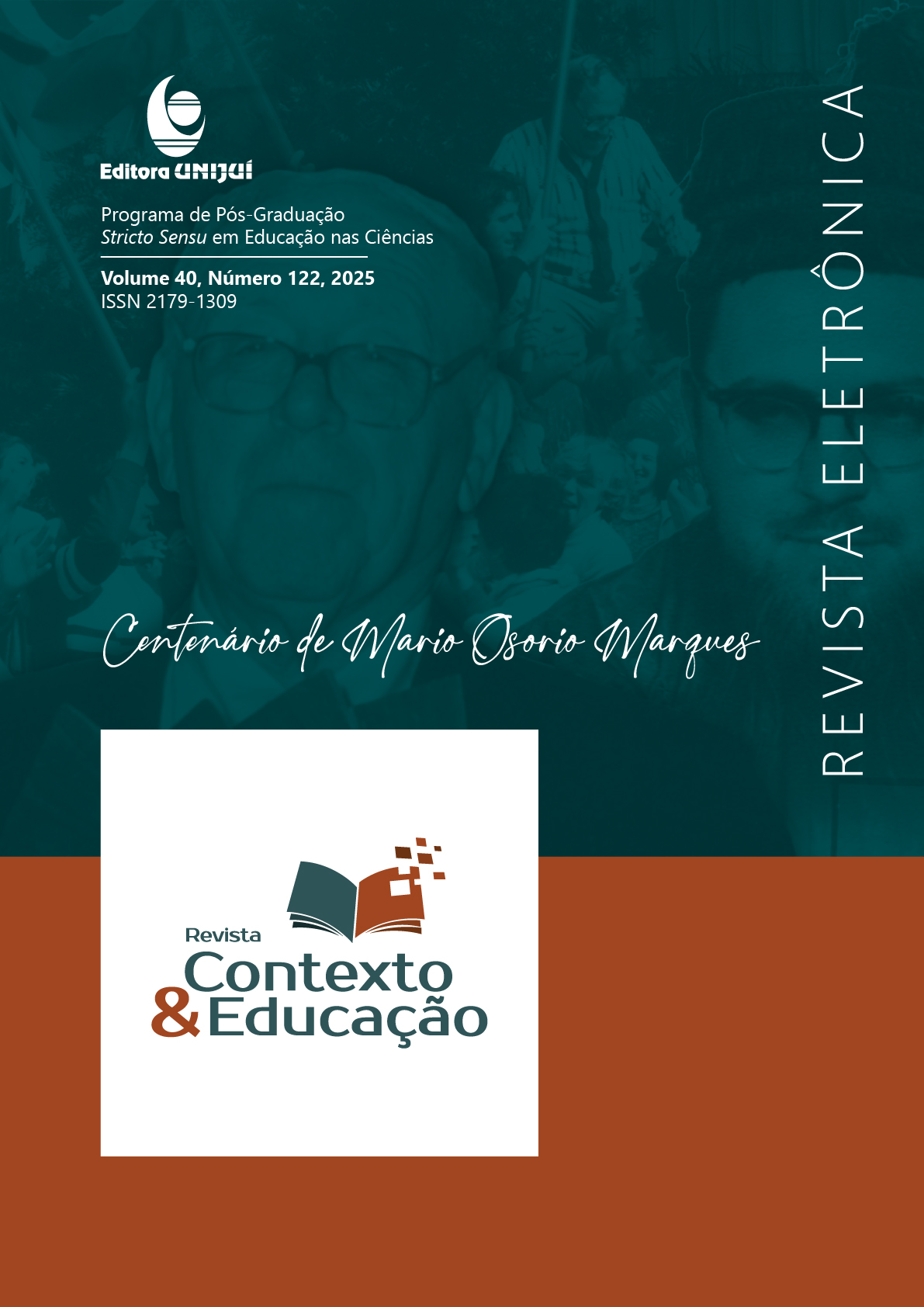Impactos do pensamento de Mario Osorio Marques no ensino de física: uma abordagem contextual e crítica
DOI:
https://doi.org/10.21527/2179-1309.2025.122.17052Palavras-chave:
Ensino de Física, Mario Osorio Marques, Abordagem pedagógicaResumo
O pensamento de Mario Osorio Marques exerce um impacto significativo no ensino de Física, promovendo uma abordagem crítica e contextualizada. Suas contribuições ressaltam a necessidade de um ensino que integre a teoria à realidade sociocultural dos estudantes, contrapondo-se à tradicional abordagem conteudista e descontextualizada. Marques enfatiza três dimensões fundamentais da pedagogia: a hermenêutica, a crítico-dialética e a epistêmico-instrumental, que, combinadas, possibilitam uma formação docente reflexiva e emancipatória. No ensino de Física, Marques propõe uma metodologia que valoriza a interdisciplinaridade e a problematização, tornando os conteúdos mais significativos e aplicáveis ao cotidiano dos estudantes, ao passo que ele alerta sobre a excessiva matematização e a mecanização do ensino, contudo defende um aprendizado que estimule a investigação e o pensamento crítico. Além disso, ressalta a importância da formação docente contínua, destacando que o professor deve atuar como mediador do conhecimento, promovendo a autonomia dos educandos. A abordagem marqueseana dialoga com perspectiva de Paulo Freire, mas se diferencia por enfatizar a pedagogia como um campo epistemologicamente autônomo. Suas ideias incentivam práticas pedagógicas inovadoras que rompem com modelos tradicionais e promovem a participação ativa dos estudantes no processo de aprendizagem. Dessa forma, este artigo traz uma análise de como a proposta de Marques representa um caminho para superar desafios no ensino de Física, aproximando-o das experiências concretas dos estudantes e contribuindo para uma educação transformadora.
Referências
BARRETO, Elba Siqueira de Sá. Políticas de formação docente para a Educação Básica no Brasil: embates contemporâneos. Revista Brasileira de Educação, v. 20, nº 62, jul./set. 2015.
BATTISTEL, Orildo Luis; HOLZ, Sheila Magali; SAUERWEIN, Ines. Motivação e eficiência em estratégias de ensino de física no nível médio. Revista Brasileira de Ensino de Física, v. 44, p. e20210278, 2022.
BERTOTTI, Rudimar Gomes; RIETOW, Gisele. Uma breve história da formação docente no Brasil: da criação das escolas normais às transformações da ditadura civil militar. XI Congresso Nacional de Educação – Educere. Pontifícia Universidade Católica do Paraná. Curitiba, de 23 a 26 de setembro de 2013.
BOUFLEUER, José Pedro; REZER, Ricardo. Mario Osorio Marques: breve biografia de um pensador da educação. Pedagógica: Revista do programa de Pós-graduaçao em Educaçao-PPGE, v. 18, n. 37, p. 15-27, 2016.
FERREIRA, Marcelo; DA SILVA FILHO, Olavo Leopoldino. Ensino de física: fundamentos, pesquisas e novas tendências. Plurais - Revista Multidisciplinar, v. 6, n. 2, p. 9-19, 2021.
GATTI, Bernadete Angelina. Formação de professores no Brasil: características e problemas. Educ. Soc., Campinas, v. 31, nº 113, p. 1.355-1.379, out./dez. 2010.
KUHN, Martin; CALLAI, Helena Copetti. Teoria crítica, hermenêutica e formação de professores: contribuições de Mario Osorio Marques. Pedagógica: Revista do programa de Pós-graduação em Educação-PPGE, n. 22, p. 1-19, 2020.
KUHN, Martin; KUHN, Mara Lúcia Welter. Mario Osorio Marques: Exigências à formação e à docência em sala de aula. Revista Triângulo, Uberaba, Minas Gerais, v. 12, n. 1, p. 149-161, 2019. Disponível em: https://doi.org/10.18554/rt.v12i1.2556. Acesso em: 22 de dezembro de 2024.
LIMA, André Luiz Alves et al. As contribuições filosófico-educacionais de Mario Osorio Marques. 2014.
MARQUES, Mario Osorio. Escrever é preciso: o princípio da pesquisa. Ijuí: Ed. Unijuí, 1997.
MARQUES, Mario Osorio. O educador/pedagogo na relação educativa direta. In: Contexto e Educação. Ijuí: Livraria Unijuí Editora, v. 1, n. 1, jan./mar. 1990.
MARQUES, Mario Osorio. Pedagogia: a ciência do educador. 3. ed. rev. Ijuí: Ed. Unijuí, 2006.
MOREIRA, Marco Antonio. Desafios no ensino da física. Revista Brasileira de Ensino de Física, v. 43, p. e20200451, 2021.
PANSERA DE ARAUJO, Maria Cristina; SCHORN, Solange Castro. FORMAÇÃO DOCENTE, CURRÍCULO E POLÍTICAS PÚBLICAS. Revista Contexto & Educação, [S. l.], v. 32, n. 103, p. 1–4, 2017. DOI: 10.21527/2179-1309.2017.103.1-4. Disponível em: https://revistas.unijui.edu.br/index.php/contextoeducacao/article/view/7433. Acesso em: 3 mar. 2025.
PANSERA DE ARAUJO, Maria Cristina; SCHORN, Solange. SABERES DIVERSIFICADOS NO DESENVOLVIMENTO DE CURRICULO PARA FORMAÇÃO CIDADÃ. Revista Contexto & Educação, [S. l.], v. 33, n. 104, p. 1–4, 2018. DOI: 10.21527/2179-1309.2018.104.1-4. Disponível em: https://revistas.unijui.edu.br/index.php/contextoeducacao/article/view/7613. Acesso em: 3 mar. 2025.
PRESTES, Nadja Hermann. A razão, a teoria crítica e a educação. In: PUCCI, Bruno (Org.). Teoria crítica e educação. Rio de Janeiro: Vozes, 1994.
SILVA, João Batista da; SALES, Gilvandenys Leite; CASTRO, Juscileide Braga de. Gamificação como estratégia de aprendizagem ativa no ensino de Física. Revista Brasileira de Ensino de Física, v. 41, p. e20180309, 2019.
Downloads
Publicado
Como Citar
Edição
Seção
Licença
Copyright (c) 2025 Revista Contexto & Educação

Este trabalho está licenciado sob uma licença Creative Commons Attribution 4.0 International License.
Ao publicar na Revista Contexto & Educação, os autores concordam com os seguintes termos:
Os trabalhos seguem a licença Creative Commons Atribuição 4.0 Internacional (CC BY 4.0), que permite:
Compartilhar — copiar e redistribuir o material em qualquer meio ou formato;
Adaptar — remixar, transformar e criar a partir do material para qualquer fim, inclusive comercial.
Essas permissões são irrevogáveis, desde que respeitados os seguintes termos:
Atribuição — os autores devem ser devidamente creditados, com link para a licença e indicação de eventuais alterações realizadas.
Sem restrições adicionais — não podem ser aplicadas condições legais ou tecnológicas que restrinjam o uso permitido pela licença.
Avisos:
A licença não se aplica a elementos em domínio público ou cobertos por exceções legais.
A licença não garante todos os direitos necessários para usos específicos (ex.: direitos de imagem, privacidade ou morais).
A revista não se responsabiliza pelas opiniões expressas nos artigos, que são de exclusiva responsabilidade dos autores. O Editor, com o apoio do Comitê Editorial, reserva-se o direito de sugerir ou solicitar modificações quando necessário.
Somente serão aceitos artigos científicos originais, com resultados de pesquisas de interesse que não tenham sido publicados nem submetidos simultaneamente a outro periódico com o mesmo objetivo.
A menção a marcas comerciais ou produtos específicos destina-se apenas à identificação, sem qualquer vínculo promocional por parte dos autores ou da revista.
Contrato de Licença (para artigos publicados a partir de outubro/2025): Os autores mantém os direitos autorais sobre seu artigo, e concedem a Revista Contexto & Educação o direito de primeira publicação.


